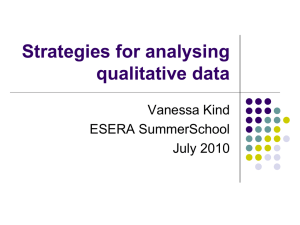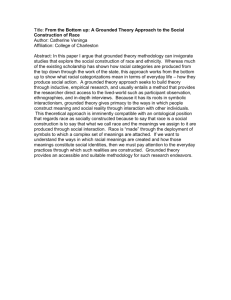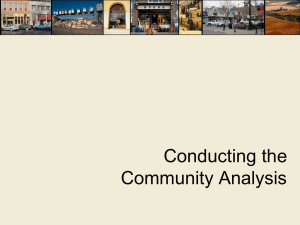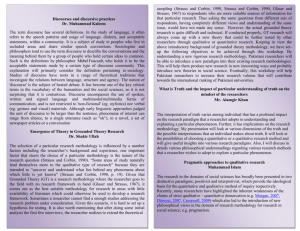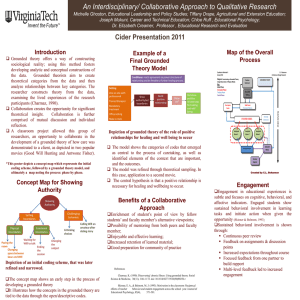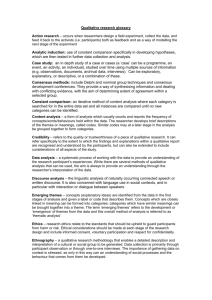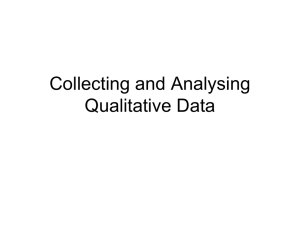A study of Management Change in An Garda Síochána Utilising
advertisement
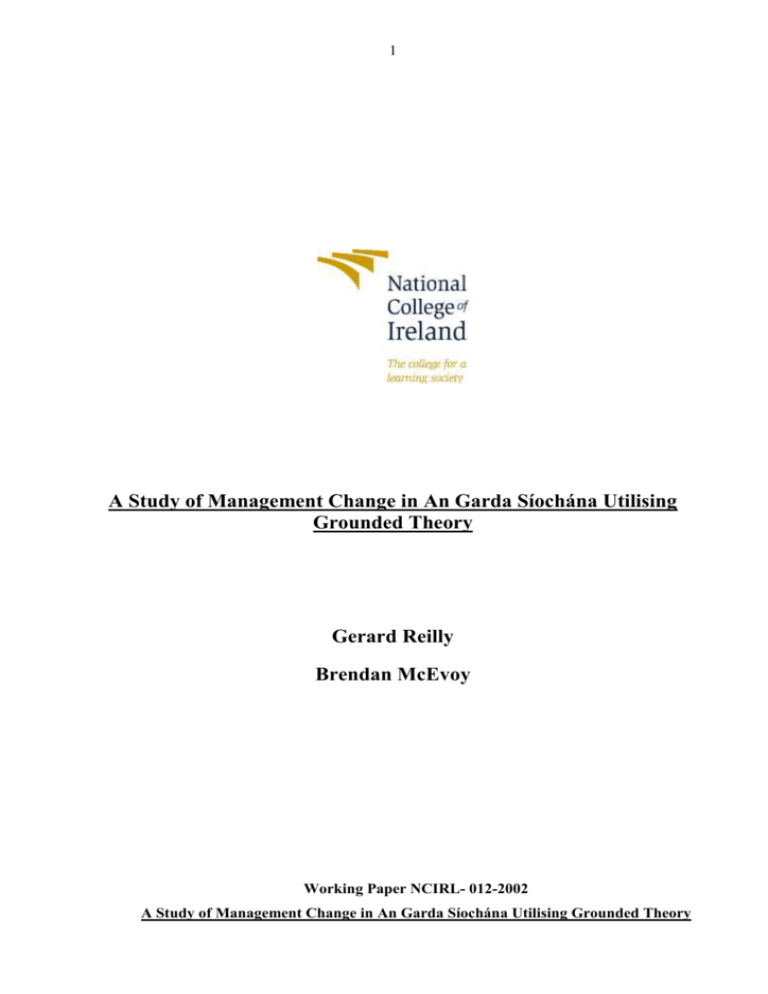
1 A Study of Management Change in An Garda Síochána Utilising Grounded Theory Gerard Reilly Brendan McEvoy Working Paper NCIRL- 012-2002 A Study of Management Change in An Garda Síochána Utilising Grounded Theory 2 Gerard Reilly, greilly@staff.ncirl.ie Brendan McEvoy, National College of Ireland 0. Abstract The purpose of this PhD study is to examine management practices in An Garda Síochána and determine how successful the organisation adapts to contemporary management practices. The researcher has been a member of An Garda Síochána for twenty-nine years and gained access to data and interviewees which was not available to outside researchers. This professional experience meant that the researcher was familiar with the context and issues that impacted on the organisation. This paper discusses the issues of using grounded theory research as a method of gaining insight into the management of change in the Irish Police Service. 1. Methodological Issues This paper contains an account of the researcher’s philosophical approach and the research strategies and techniques are discussed. In particular, the relevance of grounded theory as developed by Glaser and Strauss (1967) to the study of contemporary management practices in An Garda Síochána is examined. There is a need to approach discussions on methodology in a way that highlights the vital link between theory and method, between the worldview to which the researcher subscribes, the type of research questions posed and the technique that is to be adopted as a basis for research (Morgan and Smircich 1980). A concentration on method alone distorts the link between the views held by the researcher and the overall research method. Morgan and Smircich (1980) consider that this gives the illusion that methods themselves rather than the orientations of the researcher generate knowledge. The form of analysis offered by Burrell and Morgan (1979) suggests that all approaches to social science are connected to ontology, human nature, and epistemology. 3 2. The Interpretative Approach to Qualitative Research The interpretative approach is characterised by a particular ontology, epistemology, and methodology. Researchers working in this tradition assume that people’s subjective experiences are real and should be taken seriously (ontology). We can understand other’s experience by interacting with them and listening to what they tell us (epistemology), and that qualitative research techniques are best suited to this task (methodology). Blanche and Kelly’s (1999) work on interpretative methods, correctly states that the interpretative approach tries to harness and extend the power of ordinary language and expression, developed over thousands of years, to help us better understand the social world we live in. Dilthey (1823-1911) introduced to the cultural sciences the method of “verstehen” which was used in this research. “Verstehen” seeks to understand the inner minds and feelings of human beings and how they manifest themselves in action, in institutions and organisations. Interpretative research relies on first hand accounts and tries to describe its finding in rich detail. This study saw the researchers own role as part of the research instrument linking the research, the researcher and theory, in order to fully understand contemporary management practices in An Garda Síochána. Hayano (1979, 1982) formulated the term ‘auto ethnography’, i.e. researching one’s own culture. Applying this three way switching process (Mc Auley 1985), this research is clearly located in the hermeneutic tradition, focussing on single occurrences rather than universal laws. In origin, hermeneutics is the interpretation of text in order to re-establish their “true” meaning (Baurman 1978). This interpretive approach comes within the auspices of qualitative research. It is difficult to classify qualitative studies into specific categories as qualitative researchers use a number of different techniques. A researcher can use a mix of questionnaires, interviews, and observations within a single study. Several attempts have been made to classify the major areas of qualitative research (Miles and Huberman, 1984: Cresswell, 1994; Marshall and Rossman, 1999). Lee (1999) summarises four underlying 4 themes of qualitative research. Firstly, research occurs in natural settings. Secondly, the data is derived from the participants’ perspective. Thirdly, qualitative research design is flexible and reflective allowing a researcher to adjust data collection methods. Finally, instrumentation, observation methods, and modes of analysis are not standard. No method of research is even close to perfect and all studies are open to question. The construction of an argument that answers as many potential objections as possible is the paramount goal of research methodology (Wakefield, 1995). A valid form of qualitative research for management scientists is grounded theory (Martin & Turner, 1986, Lee 1999). Grounded theory is derived from data systematically collected and interpreted during the research process (Strauss and Corbin 1998). The study of change in an organisational setting is suited to inductive methodology (Van Maanen, 1979) and this approach can foster development of theory concerning change in organisations. Mintzberg (1979) describes two essential steps in inductive research. The first is detective work, where the researcher searches through a phenomenon looking for order, following one lead to another. The second step in inductive research is the creative leap, where the researcher generates theory from data. This process is described by Glaser and Strauss (1967) as a constant comparative method of analysis and is central to grounded theory. Every theory requires the creative leap, however small, the breaking away from the expected to describe something new (Mintzberg 1979). To achieve this creative leap it is necessary to be on site and be there long enough to be able to understand the phenomena. Mintzberg (1979) considers that it is not sufficient to discover interesting relationships; you must be able to explain the richness of the discovery. Those creative leaps seem to come from our subconscious and we need to be in touch constantly with our research. Strauss and Corbin (1998) consider that these discoveries should be presented as sets of inter related concepts to give insight to the study. The researcher has given an explanation of the interpretative approach to qualitative research and demonstrated how the process may be used inductively to study 5 organisations. It is appropriate to discuss how this approach can be linked to generating theory on contemporary management practices in An Garda Síochána. 3. Approach to the Generation of Theory The research focus was to investigate the effect of changes in management practices in An Garda Síochána. The method of research concerns itself with the uniqueness of the setting and quite often the motivation to select a particular area is based on a personal need to understand it (Truzzi 1974). Eisenhardt (1989) describes the research strategy as focusing on understanding the dynamics present within a single setting. Corbin and Strauss (1990; 7) consider that theories cannot be built with actual incidents or activities as observed or reported; that is, from "raw data.” The incidents, events, happenings are taken as, or analysed as, potential indicators of phenomena, which are thereby given conceptual labels. Grounded theory is often assumed to be an exercise in inductive reasoning only. In reality it is much more (Lee 1999, p. 46). Preliminary notions must be subjected to subsequent empirical testing against additional data (Kuhn 1996). An essential feature of a theory building approach is comparison of the emergent concepts with the extant literature (Eisenhardt 1989). This involves seeing what it is similar to, what it contradicts and why. If researchers ignore conflicting findings, confidence in the findings is reduced. Conflicting literature can represent an opportunity for greater understanding. Literature discussing similar findings is important because it ties together similarities in phenomena not associated with each other. Where similar findings in very different context are linked, this strengthens the results of the research. This linkage with a variety of literature in other contexts raises the readers’ confidence (Eisenhardt 1989). The system of grounded theory as introduced to researchers by Glaser and Strauss (1967) and modified by Strauss & Corbin (1990) (1998) provides the verification necessary for rigorous qualitative research. Continuing with the hermeneutic approach, the evaluation of creditable and consistent grounded theory is reviewed. Grounded theory methodology explicitly involves 6 “generating theory and doing social research as two parts of the same process” (Glaser 1978; 2). It is a way of thinking about and conceptualising data and is easily adapted to study diverse phenomena. Grounded theory is an approach to the systematic generation of theory from qualitative data. Glaser and Strauss (1967) advocate a particular approach to qualitative research, which they termed grounded theory. The researcher begins the project without any preconceived theory in mind. The researcher starts with an area of study and allows theory to develop from data interpretation. Strauss and Corbin (1998) consider that the purpose is to build rather than test theory. The use of grounded theory methodology was not without criticism. grounded theory. Parry (1998) has identified two forms of A “partial” grounded approach where data is collected and then theorised upon and a full grounded theory approach, which is described by Glaser and Strauss (1967) and detailed further by Glaser (1978) in which the iterative approach is adapted. There are two main shortfalls with the “partial” grounded approach, which reduces its value as sound scientific research Parry (1998; 11). Firstly, the analytic process by which concepts are built up to higher levels of abstraction is not explained. Secondly, the determination of the relationship between concepts is not undertaken. Typically critics have an incomplete understanding of the logic and strategies involved and this can lead to applying inappropriate criteria on which to judge the method. In approaching research without any strong prior theory, qualitative researchers are inevitably faced with the problem of making sense out of vast amount of unstructured data. Grounded theory methodology had three purposes. Firstly, to offer a rationale for theory that was grounded, generated and developed through the interplay of data collected through the research process. Secondly, to suggest the logic for and specifics of grounded theories. The third aim was to legitimate careful qualitative research, as by the 1960s this had fallen to a low status and was not believed capable of adequate verification. Glaser and Strauss (1967) suggest that research begins by allowing ideas and categories to emerge from systematic inspection of the data. Henwood and Pidgeon (1992) correctly state that in the earlier stages of grounded research the researcher has maximum flexibility in generating new categories from data. As analysis proceeds, the 7 researcher builds a set of categories, which reflect the many instances of data. The advantage of this research is that, the theory generated is contextually sensitive, persuasive, and relevant. Grounded theory is a valid qualitative form of research for management scientists (Martin & Turner, 1986, Lee 1999) and is inductively derived from the study of the phenomenon it represents, such as change management. The grounded theory, is discovered, developed, and provisionally verified through systematic data collection and analysis. Data collection, analysis, and theory stand in reciprocal relationship with each other. In this form of research, the researcher begins with an area of study and what is relevant to that area is allowed to emerge (Strauss & Corbin 1990). This approach uses a systematic set of procedures to develop inductive theory about a phenomenon. Strauss & Corbin (1990) advise that if certain criteria are adhered to correctly and methodically, grounded theory meets the criteria for “good” scientific research. These criteria are significance, theory observation compatibility, generalizability, reproducibility, precision, rigor, and verification. Glaser and Strauss (1967) describe this process as a constant comparative method of analysis, which is central to grounded theory. Silverman (1993) posits, that the constant comparison method or “analytic induction” is a source of validity in research. This process means that concepts and preliminary ideas emerge out of data which prompt further, but more focused data collection. This process of analysis leads to the generation of further hypothesis. This process as coding is described as Coding (Glaser 1978) (Strauss & Corbin 1990). The strength of grounded theory lies in theory generation and not theory testing. Researchers must have no preconceived ideas about what the research might find (Strauss & Corbin 1990). When considering the implementation of grounded theory, it is important to recognise the theoretical sensitivity of the researcher. This is a controversial area within grounded theory because the extent to which a tabula rasa approach is feasible is highly contentious (Henwood & Pidgeon 1992; Parry 1998). Glaser and Strauss (1967) suggest that the theoretical sensitivity of the researcher has two characteristics. The first is the involvement of the researcher’s personality and 8 temperament. Secondly, the ability to have insights into the area of research. Glaser (1978) acknowledges that a researcher cannot come into a topic completely cold and that the emergent theory must be compared with the extant literature. This is to avoid the possibility of existing theories or biases being forced into the data being gathered (Parry 1998). References Baurman, Z. (1978), Hermeneutics and Social Science. Approaches to Understanding, Hutchinson, London. Blanche, M. and Kelly, K. (1999),’ Interpretative Methods’, in Blanche, M. & Durrheim A., K, (eds). Research in Practice, Applied Methods for the Social Sciences. UCT Press, Cape Town. Burrell, G. and Morgan, G. (1979), Sociological Paradigms and Organisational Analysis. Heinemann, London. Cresswell, J. W. (1994), Research Design, Thousand Oaks, Sage, CA. Dilthey, W. (1976), ‘Selected Writings’, in Richman, H. P., (eds). Cambridge University Press, London. Eisenhardt, K. (1989), ‘Building Theories from Case Study Research’. Academy of Management Review, Vol., 14, 532-550. Gersick, C. (1988), ‘Time and Transition in Work Teams; Towards a New Model of Group Development’. Academy of Management Journal, 31, 9-41. Glaser, B. (1978), Theoretical Sensitivity. Sociology Press. CA. Glaser, B. G. & Strauss, A. L,. (1967), The Discovery of Grounded Theory: Strategies for Qualitative Research. Aldine. New York. Hayano, D. M. (1979), Auto-ethnography, Human Organizations, 38, pp. 99-104. Hayano, D. M. (1982), Poker Faces, University of California Press. Lee, T. (1999), Using Qualitative Methods in Organisational Research. Sage. London. Martin, P. Y. & Turner, B. A (1986), ‘Grounded Theory and Organizational Research’. Journal of Applied Behavioral Science, 22(2) 141 –157. 9 Marshall, C. & Rossman G. (1999), Designing Qualitative Research 3rd Ed. Sage Publications, London. Miles, M. & Huberman, A. (1984), Qualitative Data Analysis: A Source Book of New Methods, Sage, Beverly Hills. Mintzberg, H. (1979), ‘An Emerging Strategy of Direct Research’. Administrative Science Quarterly, December, Vol. 24, p582. Morgan, G. & Smircich, L. (1980), ‘The Case for Qualitative Research’, Academy of Management Review. Vol. 5, No. 4, pp 491-500. Mc Auley, J. (1985), ‘Hermeneutics as a Practical Research Methodology in Management’, Management Education, and Training. vol. 16. no. 3, pp 292-299. Parry, K. (1998), ‘Grounded Theory and Social Process: A New Direction for Leadership Research’. Leadership Quarterly, Spring. Vol. 9 Issue 1, p85. Silverman, D (1993), Interpreting Qualitative Data: Methods for Analyzing Talk, Text, and Interaction. Sage. London. Strauss, A. & Corbin, J. (1990), Basics of Qualitative Research, Grounded Theory Procedures and Techniques, Sage, London. Strauss, A. & Corbin, J. (1998), Basics of Qualitative Research, Techniques and Procedures for Developing Grounded Theory, 2nd edition. Sage, London. Truzzi, M. (1974), Verstehen: Subjective Understanding in the Social Sciences, AddisonWesley. Reading, Mass. Van Maanen, J. (1979), ‘Reclaiming Qualitative Methods for Organisational Research’, Administrative Science Quarterly, Vol. 24. pp 52-56. Wakefield, J. (1995), ‘When an Irresistible Epistemology Meet an Immovable Ontology’. Social Work Research. March, Vol. 19. Issue 1, p 9.

